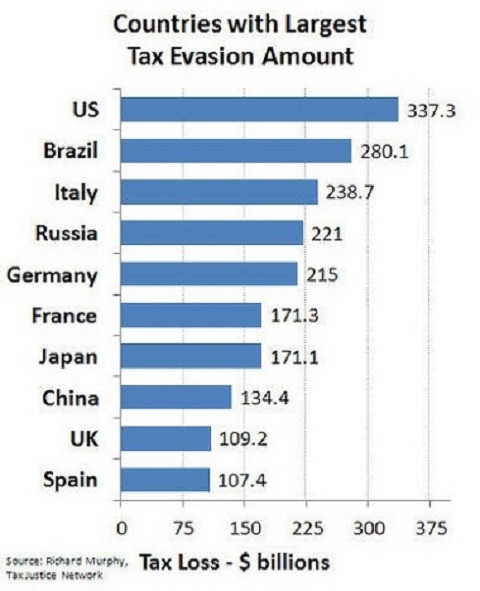Analytics, EU – Baltic States, Modern EU, Taxation
International Internet Magazine. Baltic States news & analytics
Sunday, 28.12.2025, 12:49
Combating tax evasion: urgent task for EU governments
 Print version
Print version |
|---|
Addressing base erosion and profit shifting (beps) is becoming
a key priority of governments around the world. In 2013, the OECD and G-20
countries adopted a 15-point Action Plan to address BEPS. Beyond securing
revenues by realigning taxation with economic activities and value creation,
the BEPS project aims to create a single set of consensus-based international
tax rules to address profit shifting and, finally, to protect tax bases while
offering increased certainty and predictability to taxpayers.
In 2016, the OECD and G20 established an Inclusive Framework on BEPS to allow
interested countries and jurisdictions to cooperate with OECD and G-20 member states
in developing some BEPS standards and monitoring its implementation; over 100
countries and jurisdictions have joined the “inclusive framework”.
More in: https://www.oecd-ilibrary.org/taxation/oecd-g20-base-erosion-and-profit-shifting-project_23132612
On OECD’s Action plan on BEPS from 2013 in: https://read.oecd-ilibrary.org/taxation/action-plan-on-base-erosion-and-profit-shifting_9789264202719-en#page40
BEPS as a national strategy to combat tax havens
Main feature
behind the BEP is tackle the corporate executes’ intention to address “tax
inversion” into a tax haven by “managing” the profit shifting (or earnings
strip); it is the latter that is actually represent the untaxed profits moved to
the tax haven.
The BEPS’ techniques
have been used extensively by the US companies during 2004-17, mainly MNCs, to create
enormous untaxed offshore cash reserves in size of $1-2 trillion in numerous tax
havens (there are about 40 presently around the world, including some in
Europe).
The OECD
estimated in 2017, that BEPS technique (despite the OECD’s project during
2012-16) helped “shielding” about $100-200 bn in annual corporate profits from
tax (some say that the figures are closer to S $250 bn per annum. Apple
executed in 2015 the largest recorded BEPS transaction in history when it moved
$300 bn of its profits to Ireland; at that time it was called a hybrid-tax inversion.
Due to multinational
enterprises exploiting gaps and mismatches between different countries' tax
systems, a proper domestic/national tax base
erosion and profit shifting laws and regulations can affects all other
countries.
MNCs and big
corporations operating internationally, must act together with the national
governments to tackle BEPS and restore trust in domestic and international tax
systems.
It has been
estimated by OECD that BEPS practices cost countries about $100-240 bn in lost
revenue annually, which is the equivalent to 4-10% of the global corporate
income tax revenue.
Working together the
OECD member states (of which the Baltic States are members) have to implement BEPS
Inclusive Framework and 15 Actions to tackle tax avoidance, improve the
coherence of international tax rules and ensure more transparent tax systems.
Table I: Key
figures
- Over 130 countries around the world agreed to cooperate on the BEPS’
package implementation;
- More that $240 bn are lost annually due to tax avoidance by multinational
companies, and = More than 85 countries and jurisdictions have signed the
Multilateral Instrument on BEPS.
|
Three Baltic
states (Estonia, Latvia and Lithuania) have several “cooperation lines” with
OECD’s Beps: on exchange of
information on request (EOIR), on automatic exchange of information (AEOI),
as well as reporting on existing harmful tax practices (Action 5), exchange
of information on tax rulings and preventing treaty abuse, etc. Source: https://www.oecd.org/tax/beps/ However, the biggest offshore jurisdictions for the EU
states are, actually within the European shores: five main EU offshore states
attract annually over € 3 bn, the money which could be otherwise used for
increased social-economic growth in the EU member states. Table II: Largest tax “evaders”
The first
recognized European tax haven hub was the Zurich-Zug-Liechtenstein
triangle created in the mid-1920s; later joined by Luxembourg in 1929. Privacy
and secrecy were established as an important aspect of European tax havens. Modern European
tax havens also include corporate-focused tax havens, which maintain higher
levels of OECD transparency, such as the Netherlands and Ireland. European
tax havens act as an important part of the global flows to tax havens, with
three of the five major global OFCs being European (e.g. the Netherlands,
Switzerland, and Ireland). Four European-related tax havens appear in the
various notable “top 10 tax havens” lists, e.g. the Netherlands, Ireland,
Switzerland and Luxembourg. Source: https://en.wikipedia.org/wiki/Tax_haven |
Global and European
Traditional tax
havens function by about zero rates of taxation through limited bilateral tax
treaties. However, present base erosion and profit shifting (beps) enable MNCs to
achieve "effective" tax rates closer to zero, not just in the haven
but in all countries with which the haven has tax treaties; putting them on tax
haven lists. According to modern studies, top 10 tax havens include
corporate-focused havens like the Netherlands, Singapore, Ireland, the U.K.,
Luxembourg, Hong Kong, the Caribbean (the Caymans, Bermuda, and the British
Virgin Islands) and Switzerland; the latter four jurisdictions are regarded as both
major traditional tax havens and major corporate tax havens. Corporate tax
havens often serve as channels to traditional tax havens.
The first
recognized European tax haven hub was the Zurich-Zug-Liechtenstein
triangle created in the mid-1920s; later joined by Luxembourg in 1929. Privacy
and secrecy were established as an important aspect of European tax havens.
Modern European
tax havens also include corporate-focused tax havens, which maintain higher
levels of OECD transparency, such as the Netherlands and Ireland. European tax
havens act as an important part of the global flows to tax havens, with three
of the five major global OFCs being European (e.g. the Netherlands,
Switzerland, and Ireland). Four European-related tax havens appear in the
various notable “top 10 tax havens” lists, e.g. the Netherlands, Ireland,
Switzerland and Luxembourg.
Source: https://en.wikipedia.org/wiki/Tax_haven
Table III: EU’s offshore
tax jurisdictions as recipients (one year -2016, in Euros)
Ireland – over a bn
(!);
The Netherlands –
800 million;
Luxembourg – 700 million;
Malta – 400 million,
Belgium – 300 million;
Switzerland –
about 300 million.
All other jurisdictions (including, Bermuda, Caribbean
Islands, Singapore, BVIs, etc.)
–
about 2,5 bn totally.
Note: a trillion
is a thousand bn, and a bn is a thousand million; this makes one trillion as one
million million. That is almost an inconceivable number to imagine.
More in: http://datagenetics.com/blog/april12019/index.html
Data from 2016 showed, for example, that multinational
companies (MNCs) have “moved” about € 4,5 bn only from Denmark; if corporate
taxes were paid in Denmark, the national budget would have acquired
additionally about bn euros (i.e. loss of tax revenues).
Tax havens managed to make great holes in national budgets:
Germany is losing yearly about 29% of GDP, France – 24%, the UK
-21% and Denmark -12%; to compare, China is losing only 4%(due to strict transparency rules!).
Lux-leaks: just one example
In November 2014,
the International Consortium of Investigative Journalists (ICIJ) released
28,000 documents (about 4.4 gigabytes of confidential information) about
Luxembourg's confidential private tax rulings which gave PricewaterhouseCoopers’ clients during 2002-10 enormous tax benefits
in Luxembourg. This ICIJ investigation disclosed 548 tax rulings for over 340
multinational companies based in Luxembourg. The LuxLeaks' disclosures attracted international attention about
corporate tax avoidance schemes in Luxembourg; the scandal contributed to the
implementation of measures aiming at reducing tax dumping and regulating tax
avoidance schemes beneficial to multinational companies.
In March 2019,
the European Parliament voted by 505 in favour to 63 against of accepting a new
report that likened Luxembourg, Malta, Ireland, the Netherlands and Cyprus to
"tax havens facilitating aggressive tax planning". However, despite
this vote, the EU Commission did not make proper steps to include these EU
jurisdictions on the blacklist.
Conclusion. In my
view, tax havens as parasitic
to national jurisdictions with normal tax regimes and could dramatically damage
their economies. In addition, IMF research in 2018 have shown that much of the foreign
direct investments, FDIs have been coming from tax havens, i.e. resources being
stolen from the national budgets. Widely contested modern economic theories do
not see the damaging effects of corporate taxation (generally and in MNCs) on
economic growth. Looking at contemporary global tax havens’ system, one can’t
get rid of the impression of a highly injustice system covered by legal means
with lack of moral corporate responsibility.









 «The Baltic Course» Is Sold and Stays in Business!
«The Baltic Course» Is Sold and Stays in Business!

